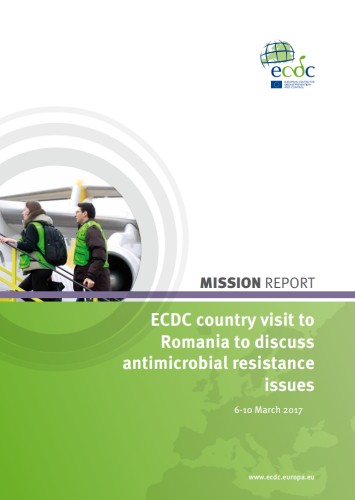Download the entire report (pdf) (updated June 2018)
 European Centre for Disease Prevention and Control. ECDC country visit to Romania to discuss antimicrobial resistance issues. Stockholm: ECDC; 2018
European Centre for Disease Prevention and Control. ECDC country visit to Romania to discuss antimicrobial resistance issues. Stockholm: ECDC; 2018
A Council Recommendation of 15 November 2001 on the prudent use of antimicrobial agents in human medicine (2002/77/EC) outlines the threat that antimicrobial resistance (AMR) poses to human health and advocates for a range of actions to be taken for its prevention and control. The Council Conclusions on antimicrobial resistance of 10 June 2008 reiterated this call for action.
To assist Member States in implementing the Council Recommendation, ECDC has developed a process for and is carrying out, upon invitation from national authorities, country visits to specifically discuss and assess the situation of the country regarding prevention and control of AMR through prudent use of antibiotics and infection control.
These country visits also help document how Member States have approached this implementation and deployed national activities and support the European Commission in evaluating this implementation. The main output of the visit is a report from the ECDC Team provided to the inviting national authority. To help the ECDC Team ensure consistency of the visits and follow-up of progress of countries, an assessment tool has been developed. This assessment tool includes ten topics. These topics are regarded as core areas for successful prevention and control of AMR and are based on Council Recommendation 2002/77/EC and on the Council Conclusions of 10 June 2008. The assessment tool is used as a guide for discussions during the visit.
Following an official invitation by the Ministry of Health dated 7 October 2016, an ECDC team conducted visits and meetings to discuss AMR issues in Romania with the overall objective of providing an evidence-based assessment of the situation in Romania regarding prevention and control of AMR through prudent use of antibiotics and infection control.
The current levels of antimicrobial resistance (AMR) in Romania are a serious concern. The reported levels of AMR in key indicator bacteria from humans are very high and/or rising in comparison to most other EU/EEA countries.
Several factors are likely to contribute to the current situation. There is a high consumption rate of antimicrobial agents in human medicine in general and the widespread use of last-line broad-spectrum antimicrobial agents is worrying. There also appear to be constraints in terms of infrastructure in hospitals and a skills shortage in key
healthcare personnel.
In addition, Romania lacks robust data on AMR rates, healthcare-associated infections (HAIs) and antimicrobial consumption at the local level to inform treatment guidelines, achieve prudent antibiotic use and target infection prevention and control (IPC) measures. Other contributing factors include inadequate multidisciplinary collaboration between clinicians, microbiologists and epidemiologists and limited collaboration between human and veterinary domains with regard to AMR.
There are, however, several areas of good practice and evidence of change for the better. Most importantly, the recognition that certain areas require improvement is driving the momentum for change. Examples of good practice include the public awareness campaign to limit use of antibiotics and the initiatives to limit the sale of over-the-counter antimicrobial agents. Change is being driven by committed, motivated and knowledgeable healthcare staff who spread the message regarding prudent use of antibiotics and IPC in their everyday work environments. These drivers for change and the staff who strive to achieve this change need to be supported and resourced. They also need to be provided with a structured framework to attain the desired goals.
Romania is at a cross-roads. If the current levels of AMR persist, or even increase, it is likely that untreatable HAIs, especially those caused by Klebsiella pneumoniae and Acinetobacter baumannii, will become a reality. This would have a serious impact on the ability of hospitals to provide critical medical services such as cancer treatment, major surgical procedures and intensive care.
Nu aveti inca un cont?
Alaturati-va profesionistilor in microbiologie!